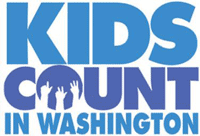for Child and Family Public Policies
To build a great future for kids and families, we need public policies that set ALL children up for success.
All babies born into this world will one day dream of what they want their future to be like. It is the job of all adults—parents, teachers, coaches, faith leaders and lawmakers—to provide children with the opportunities they need to realize a future of unleashed potential.
The opportunity gap starts young, with children of color as much as 2.6 times more likely as their white peers . By fourth grade, Black and Latino children are more likely to be , a crucial milestone that predicts future success in school. As they progress through adolescence into young adulthood, children of color are more likely than their white peers to be diagnosed with asthma, be suspended from school, drop out of high school, and become involved with the criminal justice system. Young adults of color are less likely to graduate from college than their white peers, which has long-term implications for their job prospects, economic stability, and the future well-being of the children they will one day raise.
Children from all racial and ethnic backgrounds will beat the odds—but the deck should not be so stacked. No child should face a future limited by inequity. Together, state lawmakers and advocates can design laws, practices and policies that extend opportunity to all.
The KIDS COUNT Racial Equity Policy Tool is intended to allow policymakers to evaluate any proposed policy that purports to close the opportunity gap facing Washington children in low-income families and children of color.
Two bills in the Washington State Legislature, proposed by Senators and , would apply similar questions to policies, in school and elsewhere, that touch on children’s lives. The KIDS COUNT in Washington Racial Equity Policy Tool is intended to supplement the existing landscape of policy analysis questions regarding racial equity.
Existing racial equity policy tools. The KIDS COUNT in Washington Racial Equity Policy Tool is built from models in governmental and non-governmental organizations from across the country. We are indebted to the work that precedes and supersedes our own, and we recommend the following tools to readers of this guide:
Washington’s most populous county designed the Equity Impact Review Tool to gauge the effect of proposed policies on residents’ ability to realize their potential. .
(.pdf):Produced by the City’s , the Toolkit offers data resources and definitions to guide users in an analysis of policies, initiatives, programs and budget issues that can achieve racial equity. The document links to definitions of individual, institutional and structural racism.
: Published by the . The five questions in this policy brief are intended to help understand whether a given policy will advance or hinder opportunity.
(.pdf): The 10 questions in impact assessment are designed to give users a deeper understanding of the potential effects of proposed policies on different racial and ethnic groups

